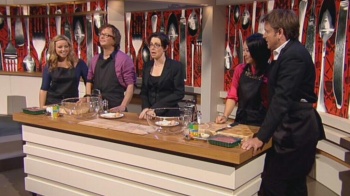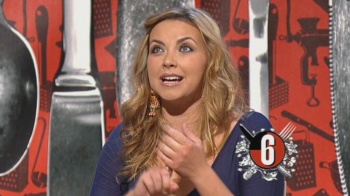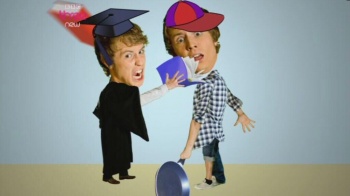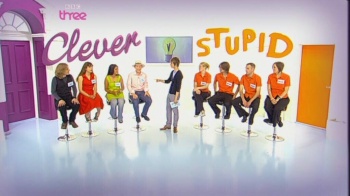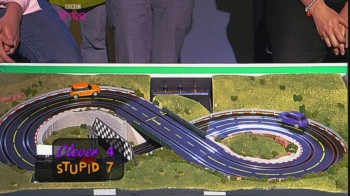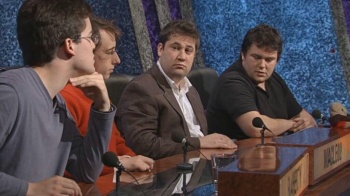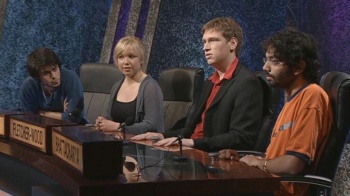Weaver's Week 2009-10-11
Last week | Weaver's Week Index | Next week
Contents |
The Big Food Fight
Betty in association with Keofilms.com for Channel 4, 10pm Tuesdays
| If there's one thing this column finds a bit dull, it's cookery programmes. People can say that Jamie Oliver has the best grill in the country, or flash their Nigellas at us, we remain unimpressed. Even quizzes about food tend to leave us flatter than a deflated souflee. So it was with a slightly heavy heart that we span the Format Tombola to generate "food and drink", hosted by the always-entertaining "Sue Perkins", with the special difficulty of "no cooking".
The Big Food Fight is billed as a comedy quiz, with Hugh Fearnsley-Whittingstall as a regular guest. Other contributors to the first edition included James Martin (who we'd never heard of), Ching-He Huang (again, our ignorance is showing), and Charlotte Church. As in the opera singer, perhaps better known for her consumption of food and drink than her creation of it. Later shows have featured the likes of Patsy Kensit and Greg Wallace. After the introductions, it's into round one, "Ten of a Kind". Contestants are asked to name ten things that fall into a specified category. Types of knife, varieties of lettuce, dishes on the menu at their favourite restaurant. It's all grist to the mill. Twenty seconds to name as many items as they can, and all Sue needs to do is implore them, try not to panic. Round two has a habit of changing each week. Perhaps the most memorable experiment was in the opening episode, when the teams were tied together so that they had one person's left hand and the other player's right hand, and had to make some dish while in their ropes. | |
| After the break comes "You Are What You Ate", a guess-the-year clip round. Guess-the-year rounds are to comedy quizzes as gunge is to children's television: a piece of filler, something to distract attention away from a lapse in imagination. They're not unwelcome, but neither will they win tremendous praise for being innovative.
For our money, the highlight of the show comes with the "Taste Test" round. Here, unusual flavours are blended into one dish – a sausage made from cheese, celery, and shortbread, for instance. The players are blindfolded, and must attempt to decide what's in their grub from the smell, taste, and texture alone. Written down, it's a perfectly simple idea, but the possibilities are almost limitless. The show ends with a quick-fire on-the-buzzers round. And, er, that's about it. The format's never going to be ramp up the tension a la Masterchef, it's not going to be as presumptious as Snacks From Our Shed or as laid-back as Còcaire nan Còcairean, for those are shows about the act of cooking. No, The Big Food Fight is about the consumption of food. It doesn't much matter how one gets the grub, so long as one does. The closest comparison is with the Food and Drink Christmas Quiz, and while there's a certain level of amusement in asking Jilly Goolden to identify precisely which vineyard a particular wine came from, that stunt had no relevance to the lives of the average viewer. The Big Food Fight is much more accessible to the man in the street. It's aimed at people who go out for dinner, not at haute cuisine gastronauts. Above all, The Big Food Fight is fun. It is a quiz, there is scoring, there are winners and losers at the end. None of that really matters, because the main requirement is for everyone to have a fun time, and that does show through in the final programme. It's the Angel Delight of game shows: light and insubstantial and probably a bit naughty for you, but a little bit moreish. |
Clever v Stupid
BBC Wales Cymru for BBC3, 8.30 Mondays
| When this column's writing reviews, our normal practice is to draft out what we think, note the points we want to make, and work them into the review. Only then do we look at reviews compiled by other, partly to make sure we've not left anything out, and partly to see if there are any points we want to riff off. It ensures that our reviews contain both honest opinions and are a fair recap of the show.
The only problem comes when a perfectly average show – because that's what Clever V Stupid is – gets ribbed mercilessly by every other reviewer. We've not found a single critic with anything positive to say about it. Brian Viner of The Independent said his wife "wondered whether anyone not professionally obliged to sit through it would suffer more than five minutes before reaching for the remote". Unreality TV said, "Whoever brought this abject drivel onto our screens needs to be lined up and shot, but only with rubber bullets." Custard TV added, "we've never seen a quiz as confused and contrived as this miasma of foetid porridge." This column is going to nail its colours to the mast: Clever V Stupid is not that bad. It's not the greatest programme in history, but it's not the worst we've seen this year. Heck, it's not the worst we've seen this week. | |
| The fundamental conceit of Clever v Stupid should be apparent from its title, but let's spell it out. A team of clever people (high IQs, degrees and doctorates) are pitched against a team of people who the stereotypes would put as somewhat less clever. Glamour models, club DJs, bodybuilders, that kind of thing. Over five rounds, they'll be given various challenges, and the best performers will have an advantage to the big finale.
The rounds are independent of each other, and they're all branded as different sorts of "intelligence". Viewers are given rounds on "emotional intelligence" (aka how well can you convince strangers that you're not lying), "practical intelligence" (how well can you navigate through Camden while carrying five pints of beer), "creative intelligence" (how well can you tell a story to children), and "physical intelligence" (how well can you make an ice cream sundae when the world is upside down). There's also "the quiz", a bit of intelligence intelligence, how well do the players know stuff about intelligence. Throughout the show, presenter Matt Edmondson refers to the jaw-dropping finale. It turns out to be a remote control car race, and a one-point advantage is worth a one-second head start. The cars are running on a fixed track, and they move in response to the brain waves of the contestants. The more relaxed the contestant, the faster their car will move, and whichever car completes ten laps first will win. | |
| The challenges themselves aren't tremendously novel, but there's a great variety from week to week, and no two items in the same show are similar. The show moves at a good speed, cramming in six rounds and some introductions into a 28-minute show without ever feeling rushed. There are some cutesy touches – buzzers shouting "Got it!" and "We know!", and the final round would have been a bit more entertaining if we hadn't seen the same thing on Brain-Jitsu last year.
There are a couple of glaring errors: the show has an annoying coloured tinge around the edge of the studio sections, and that gets old after a short while. We find ourselves laughing at the geeks, and laughing at the bimbos and bodybuilders. There's not a tremendous amount of laughing with anyone, and the resident geeks are chosen for being a bit whacky – there's no-one with the quiet charm of Gail Trimble. And it does seem that the programme's been made on a microscopic budget, with a cheap set, few props, and a rotating team of Clever people. The programme fills time with some interviews with people on the street, showing that there really are some people in Britain who don't know where Sheffield is. Is this a failure of their knowledge, or an indictment of the educational system? Oops, sorry, we're asking difficult questions in a direct manner, and that would never do on BBC3. The youth channel prefers to address such deep matters in an indirect, almost deliberately obtuse manner. Viewers are invited to make their own decision on whether they want the swots to win or lose, there's no editorial position from the host. This column is the first to applaud people who have great book learning (see University Challenge review elsewhere, and Only Connect passim), but we know that this isn't the only valid form of learning. Some people are great hairdressers, some people have the physical blessing to be a model, some people are good television presenters (and, from what we've seen, Matt Edmondson is already one of them). Clever v Stupid isn't great television, but it gently asks interesting philosophical questions. There are programmes far more worthy of vitriol out there. |
University Challenge
Heat 13: St Andrews v Somerville Oxford
| The first buzz is a spectacular one, getting "abracadabra" from its Hebrew roots. It's answered by St Andrews, the oldest university in Scotland and third-oldest in the UK, and a friend of traditions. Students don't walk on the cobbles for fear of bad luck, and wear bright red gowns when in the town. Previous teams have worn them in the UC studio, this year's crew are smartly dressed, albeit without a tie amongst them.
Nostalgia comes from "return to native land" and "pain"? We learn something new every week. There isn't a biologist in the room, which might explain why both sides missed the elements in DNA; we're not entirely sure how anyone can confuse Bristol, a city in England, with Kolkota, a city in India. The first visual round is on flags of international navies, and it's answered by Somerville Oxford. That's a young college, founded by Mary Somerville for the education of young women; it remained single-sex until admitting men in the early 1990s. Famous former students include the politician Shirley Williams and the author Dorothy L Sayers. It's got them off the mark, but St Andrews had a good lead, 65-20. | |
| The lead stretches as St Andrews pick up the wordplay bonuses (words differing by their initial letter) and subsequent starter. Somerville know their Greek letters, or at least how ? is commonly used to denote the final pre-release version of software. Classicisms and Geekery of the Weekery in one fell swoop – impressive! So is St Andrews' knowledge of former colonies. The audio round is on Ninth Symphonies, it allows every St Andrews player to answer a starter, and they have a comfortable lead, 145-60.
The AMPAS awards for 1989 form a round of bonuses, and we should remember that many of the players were still in nappies at the time. Who would call their arts centre The Armadillo? Who would call their arts centre The Aardvark, for that matter? The mind boggles. The teams don't remember The Treasure Seekers but do remember the Roman goddess of the sewers? The mind boggles some more. We'll not laugh at St Andrews for guessing "Kiev" when asked to name a battle sharing its name with a chicken dish, because that's what we shouted. Paintings of Bacchus form the second visual round, and it's St Andrews leads 230-85. That's just about Game Over: St Andrews need to take their foot off the accelerator to give Somerville any chance of the repechage. It's not exactly happening, they're going for the highest score of the series, currently the 270 of St John's Oxford. Somerville pull themselves above 100 with a few minutes to play, make progress on vaccines, and all of their players get a starter with a few moments left. Can they pull off a storm into the repechage? Can St Andrews get that highest score? There's not time for both, and when Somerville remember that Macmillan introduced life peerages, they're on, but the gong *just* beats them to the last bonus question. St Andrews have won, 255-150. | |
| Somerville's bonus conversion rate was a respectable 14/26, and captain Guy Fletcher-Wood led with six starters. Christopher Flaherty was best on the buzzers for St Andrews with nine starters correct, tying with Tom Spellar of Jesus Oxford for most so far. St Andrews had one missignal, and 24/42 on the bonuses. If Somerville didn't lose it with two missignals, they might have lost it as ten starters were missed by both sides: the overall conversion rate was 71/102.
Next match: Emmanuel Cambridge v Regent's Park Oxford | Repechage standings:
|
Mastermind
Heat 7
Yes, we know how this works. Just get to the quiz.
Ian Scott Massie kicks us off with the Life and Work of Paul Nash. The subject was an artist (1889-1946), who is best-remembered for his work to do with the First World War. He was invalided back from the front in 1917, and critics describe his pictures as "nightmarish". There's relatively little in the round about his war work, and more about his subsequent career. Nothing puts the contender off, he ends on 14 (0).
Sarah Dakin tells us about the Films of Tim Burton. The contender asserts that Burton (b 1958) has a style of his own, not least from using the same set designers, costumers, and so on. Others suggest his style – comedy horror, or horror comedy – is one he's made his own. The contender recovers from a shaky start to end on 11 (2).
Andrew Warmington will tell us about Ancient Greece 490-323 BC. These were the years of the wars, beginning with the matches against Persia, and latterly against other city states like Sparta, Ajax, and CSKA Arcadia. Hmm, is the host being a little more mumbly than normal? Here's the second contender to ask for a repeated question. Again, it doesn't hurt, he ends on 14 (0).
Dave Taylor talks of Paul Dirac. The contender compares Dirac to Einstein; his subject (1902-84) founded quantum electrodynamics, was a graduate of St John's Cambridge, and won the Nobel Prize for Physics in 1933. The Hitchhikers' Guide to the Galaxy calls him "Britain's Unsung Genius". We don't understand much of his work, but we do understand the score: 10 (0).
"Most of the questions I did not understand" confesses the host of Dave Taylor's subject. He begins by remembering the seat held by Mrs. Margaret Thatcher; over on BBC Parliament, they're showing her first successful election right now, and her result will be up in about two hours. The round takes him to Rockall and Vera Lynn, and finishes on 21 (1).
Sarah Dakin knows the birthplace of television fashion policeperson Gok Wan, but has the misfortune to hear many popular culture questions from the years before her birth, ending on 16 (4). Who remembers Colin Welland anyway?
The repechage:
- Ian Scott Massie 26 (2)
- Les Morrell 26 (3)
- Colin Wilson 25 (0)
- William de Ath 25 (4)
- Vishal Dalal 23 (4)
- Joe Docherty 22 (5)
Ian Scott Massie needs seven to take the lead, and passes through the likes of Compo from Last of the Summer Wine in a round that simply races away. He finishes on 26 (2), which is surely going to be enough one way or the other.
Andrew Warmington needs thirteen to win, twelve to tie, and eleven to make a good run at the repechage. Much as we like the tale of Joe Biden copying a small extract of Neil Kinnock's speeches, we can't really justify a ten-second question on the topic. He's answering crisply and calmly, getting into a good rhythm. Though there's a few passes late on, it doesn't matter, he's won with 28 (3).
No edition next week, it's been taken off for live gymnastics from North Greenwich.
This Week And Next
Saturdays are settling into a pattern: Simon Cowell Annoys heading Strictly Come Dancing by a decent amount, and both clear of all-comers. The week to 27 September was no different, ITV's advantage was 11.85m to 8.7m, with Soapstar Fortunes in third place on 5.45m. The Cube managed 4.8m, and Millionaire's 3.55m was only just ahead of the 3.3m who saw University Challenge, or the year-best 3.2m for Mock the Week. Masterchef The Professionals had 3.05m, another year-best, and Dancing on Two returned with 2.25m. Mastermind continued to improve, registering 2.1m.
Cowell all the way on ITV2, 1.14m for More Annoyance, 940,000 for the Sunday repeat, and 875,000 saw Come Dine With Me on More4. Mock the Week broke half-a-million on Dave, America's Next Top Model had 410,000 for Living, and Virgin 1's great hype Restaurant In Our Living Room was seen by 180,000.
Next week's Week continues our review of the decade, by looking at shows discussing teamwork and individuality. Before then, there's an awful lot of brain fodder: Mastermind Plant Cymru reaches its final (S4C, 8.25 Thursday), a new run of Are You an Egghead? (BBC2, 4.30 weekdays), and Brain of Britain's back in the hands of with Russell Davies (Radio 4, 1.30 Monday). Comedy arrives on Have I Got News for You (BBC1, 9pm Friday). Next Saturday's showtimes: Strictly 7.15 – 9.25, film musicals; X Factor 8pm – 10pm.

